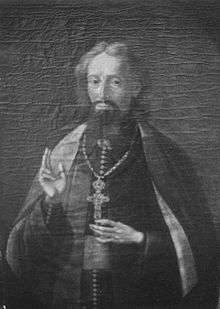Manuil Olshavskyi
Manuil Mykhaylo Olshavskyi, O.S.B.M., (born as Michal Židik; Ukrainian: Мануїл Михайло Ольшавський, Hungarian: Manó Mihály Olsavszky, Slovak: Manuel Michal Olšavsky, c. 1700 – 5 November 1767) was the bishop of the Vicariate Apostolic for the Ruthenians in Mukacheve from 1743 to his death in 1767.
Manuil Mykhaylo Olshavskyi | |
|---|---|
| Eparch of Mukacheve | |
 | |
| Church | Ruthenian Catholic Church |
| Diocese | Vicar Apostolic for the Ruthenians in Mukacheve |
| Appointed | 5 September 1743 |
| Term ended | 5 November 1767 |
| Predecessor | Havryil Blazhovskyi |
| Successor | Ivan Bradach |
| Orders | |
| Ordination | 1725 (Priest) by Hennadiy Bizantsiy |
| Consecration | 9 Dec 1743 (Bishop) by Inocenţiu Micu-Klein |
| Personal details | |
| Birth name | Michal Židik |
| Born | about 1700 Oľšavica |
| Died | 5 November 1767 (aged 66–67) Mukachevo |
Life
Mykhaylo Olshavskyi was born in about 1700 in the village of Oľšavica, from which he took his surname (which originally was Židik). He studied philosophy in Košice and than in the Jesuit college of Trnava.[1] At the end of his studies, he was ordained asecular priest in 1725 and assigned to the Eparchy of Mukacheve, where he later became vicar of the eparchs (bishops) Stefan Olshavskyi (who was his older brother) and Havryil Blazhovskyi.
At the death of his predecessor, he was appointed on 8 February 1743 as general vicar by the Latin bishop of Eger:[2] actually at that time, following the Union of Uzhhorod, the eparch of Mukacheve was formally an apostolic vicar of the Latin diocese.[3] In a few months he was elected to the position by the clergy, designated by the Empress Maria Theresa, and so confirmed by Pope Benedict XIV on 5 September 1743.[4] He received the titular see of Rhosus and was consecrated bishop on 9 December 1743[5] by the bishop of Făgăraş, Inocenţiu Micu-Klein.[6] A short time before consecration, Mykhaylo Olshavskyi entered the Order of Saint Basil the Great and took the religious name of Manuil.[1]
In 1746 Manuil Olshavskyi was requested by Empress Maria Theresa to undertake a pastoral visit in Transylvania, that was at the time without Byzantine bishop due to the exile of Micu-Klein.[7] He again returned in Transylvania in 1761 to address, with his authority and predication, the disturbance of the Orthodox monk Sofronie.[1]
In 1756 he completed and consecrated the sanctuary of Máriapócs which was started by his predecessor Gennadius Bizanczy. To serve the sanctuary, he built a monastery and assigned it to the Basilian monks. He also built schools in Mukachevo and in Máriapócs for the instruction of the clergy, and succeeded in obtaining the necessary funding. While his predecessors in Mukachevo lived in the Saint Nicholas Monastery, on request of the monks he built an episcopal residence in town.[2] In 1764 he built, with his own money, a school of theology and one for cantors in Mukachevo.
In 1759 he could write to Propaganda Fide that in his eparchy there remained no Byzantine faithful who were not in communion with the Catholic Church. However, the jurisdictional situation of his eparchy, formally an apostolic vicariate under the Latin bishop of Eger, was not satisfactory. So Manuil Olshavskyi contested the authority of the Bishop of Eger and tried to persuade Empress Maria Theresa to give full independence to the eparchy. He could not see the results of his work, but four years after his death, in 1771, the Eparchy of Mukacheve got its independence.
Manuil Olshavskyi died in Mukachevo on 5 November 1767, and he was buried in the sanctuary of Máriapócs.[2]
Among his works, most memorable might be his Sermon et orientale de Sacra eccidentalem inter Unione quo ecclesia episcopus Rossensis.[8][9]
Notes
- Kondratovic, I.M. (1963). "The Olšavsky bishops and their activity". Slovak Studies. Rome. III: 179–198.
- Pelesz, Julian (1881). Geschichte der Union der ruthenischen Kirche mit Rom. Woerl. pp. 1033–1034.
- Herbermann, Charles, ed. (1913). . Catholic Encyclopedia. New York: Robert Appleton Company.
- "Bishop Mihály Emánuel Olsavszky, O.S.B.M." Catholic-Hierarchy.org. David M. Cheney. Retrieved 23 January 2015.
- Blazejowsky, Dmytro (1990). Hierarchy of the Kyivan Church (861-1990). Rome. p. 331.
- Nicolao Nilles (1885). Kalendarium Manuale Utriusque Ecclesiae Orientalis et Occidentalis Vol 3 Part 2. Feliciani Rauch. p. 572.
- de Clercq, Charles (1949). Histoire des conciles d'après les documents originaux, Tome XI Conciles des Orientaux Catholiques. 1. Paris: Letouzey et Ané. p. 208.
- Szinnyei Jozsef. "Olsavszky Manó Mihály". Magyar Irok Elete es Munkai. MEK. Retrieved 23 April 2011.
- Boysak, Basil (1967). Ecumenism and Manuel Michael Olshavsky: Bishop of Mukachevo (1743-1767); analysis of the Sermo de unione. University of Montréal.
| Catholic Church titles | ||
|---|---|---|
| Preceded by Havryil Blazhovskyi |
Vicar Apostolic for the Ruthenians in Mukacheve 1743–1767 |
Succeeded by Ivan Bradach |